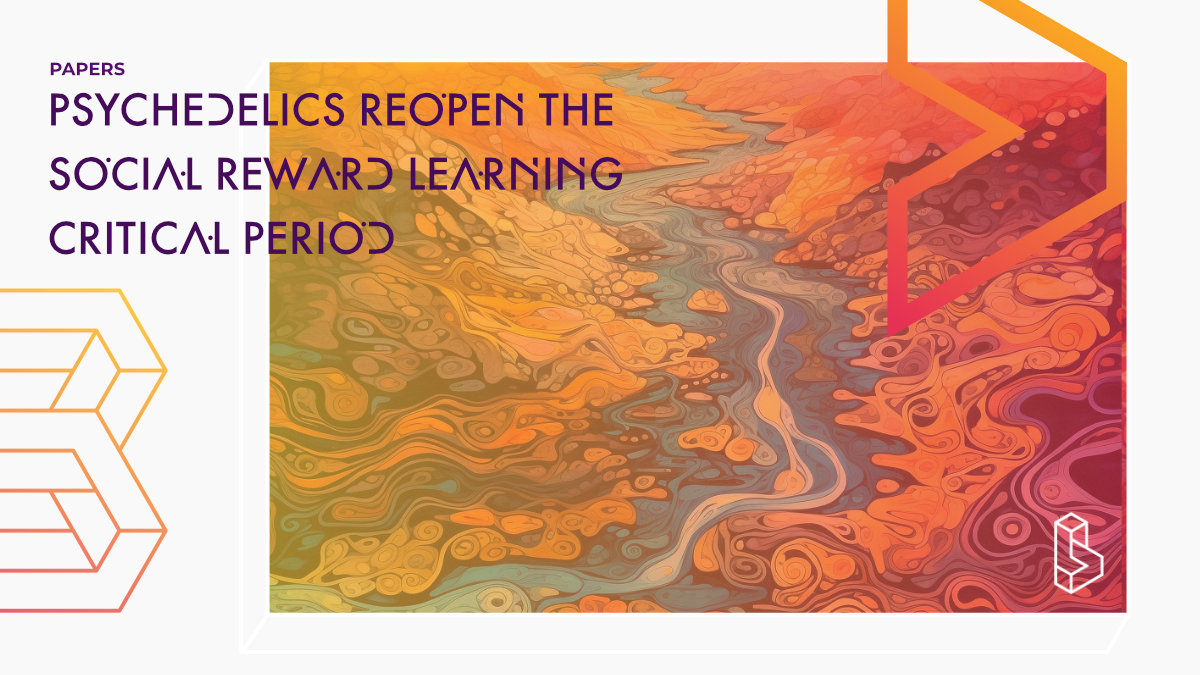This mice study shows that psychedelics (including ketamine & MDMA) open a social reward learning critical period. The duration of the drugs’ effects in humans is proportional to the time it takes for the critical period to reopen. Additionally, the restoration of oxytocin-mediated long-term depression in the nucleus accumbens is associated with the reinstatement of social reward learning in adulthood. The study also found that reorganising the extracellular matrix is a common mechanism underlying the critical period reopening caused by psychedelic drugs.
Abstract of Psychedelics reopen the social reward learning critical period
“Psychedelics are a broad class of drugs defined by their ability to induce an altered state of consciousness. These drugs have been used for millennia in both spiritual and medicinal contexts, and a number of recent clinical successes have spurred a renewed interest in developing psychedelic therapies. Nevertheless, a unifying mechanism that can account for these shared phenomenological and therapeutic properties remains unknown. Here we demonstrate in mice that the ability to reopen the social reward learning critical period is a shared property across psychedelic drugs. Notably, the time course of critical period reopening is proportional to the duration of acute subjective effects reported in humans. Furthermore, the ability to reinstate social reward learning in adulthood is paralleled by metaplastic restoration of oxytocin-mediated long-term depression in the nucleus accumbens. Finally, identification of differentially expressed genes in the ‘open state’ versus the ‘closed state’ provides evidence that reorganization of the extracellular matrix is a common downstream mechanism underlying psychedelic drug-mediated critical period reopening. Together these results have important implications for the implementation of psychedelics in clinical practice, as well as the design of novel compounds for the treatment of neuropsychiatric disease.”
Authors: Romain Nardou, Edward Sawyer, Young Jun Song, Makenzie Wilkinson, Yasmin Padovan-Hernandez, Júnia Lara de Deus, Noelle Wright, Carine Lama, Sehr Faltin, Loyal A. Goff, Genevieve L. Stein-O’Brien & Gül Dölen
Summary of Psychedelics reopen the social reward learning critical period
Psychedelics include LSD, mescaline, PCP, ibogaine, 3,4-methylenedioxymethamphetamine (MDMA), psilocybin and ketamine, which alter sensory, self, time and space perception. Although recent attempts have been made to subcategorize psychedelics based on their subjective character, chemical structure or principal binding target, the importance of these categories for therapeutic applications remains unclear.
During specific periods of brain development, the nervous system exhibits heightened sensitivity to ethologically (behaviour x environment) relevant stimuli and increased malleability for synaptic, circuit and behavioural modifications. The empathogenic psychedelic MDMA can reopen this critical period for social reward learning. MDMA is classified as an empathogen, meaning its acute subjective effects are distinctly prosocial in quality. If this characteristic is what embodies the subjective experience of reopening critical periods, then it might generalize across psychedelics.
Find this paper
Psychedelics reopen the social reward learning critical period
https://doi.org/10.1038/s41586-023-06204-3
Open Access | Google Scholar | Backup | 🕊
Cite this paper (APA)
Nardou, R., Sawyer, E., Song, Y.J. et al. Psychedelics reopen the social reward learning critical period. Nature (2023). https://doi.org/10.1038/s41586-023-06204-3
Linked Research Papers
Notable research papers that build on or are influenced by this paper
Oxytocin-dependent reopening of a social reward learning critical period with MDMAThis mice study investigates the restoration/regulation of social reward learning for patients with long-term depression using MDMA. The findings point towards the potential of understanding the pathogenesis of neurodevelopmental diseases, which are defined by social impairments, and of disorders that are effected by social influence or are a consequence of social injury.

